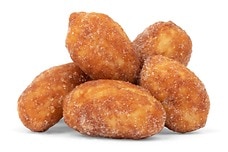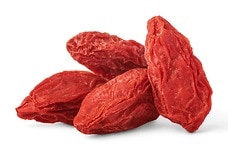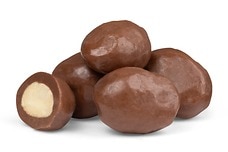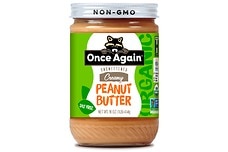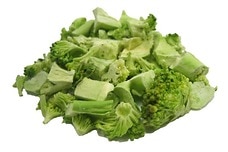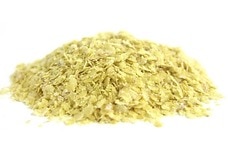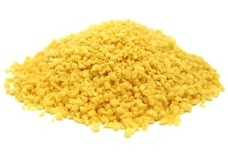Choline
Certain nutrients are considered essential for humans, meaning that we cannot synthesize them ourselves. Choline is one of these compounds. Getting enough choline in your diet keeps the body healthy, making it important to choose foods that include an adequate amount of the vitamin.
What Is Choline?
Choline is a vitamin-like nutrient that is essential for health and is involved in a number of biologic functions. For example, choline is used in the synthesis of phospholipids (phosphatidylcholine and sphingomyelin) that are essential structural components of cell membranes. While our bodies can technically synthesize very small amounts of choline, self-produced choline is not adequate to meet our nutritional needs. Thus, the remainder of the nutrient must be obtained from the diet (Delage 2015).
Role of Choline in the Human Body
Choline plays several major roles in the human body. Importantly, choline is found in the fatty tails of phospholipid molecules. Phospholipids join together to form a specialized bilayer that composes the membrane of every cell in the body. Thus, choline is essential for the basic integrity and health of our cells.
Choline also supports a range of other cellular functions. For example, choline acts as a precursor to the neurotransmitter acetylcholine. Acetylcholine is the primary neurotransmitter that governs muscle movements (Dale, Feldberg, & Vogt, 1936). Acetylcholine also supports memory and circadian rhythms. Additionally, phospholipids containing choline permit signalling within a cell. Choline is also important for fat transport and the metabolic activity of the liver.
Foods That Are Rich in Choline
Adult men (19 years and older) should aim to get 550 mg of choline per day, with adult women requiring 425 (Food and Nutrition Board, 1998). The choline needs of women increase during pregnancy to 450 mg per day, with breastfeeding women requiring 550 mg per day.
The following are good sources of choline (Delage, 2015):
- Beef liver (356 mg per 3-ounce serving)
- Wheat germ (202 mg per cup)
- Egg (147 mg per egg)
- Canned salmon (75 mg per 3-ounce serving)
- Chicken breast (73 mg per 3-ounce serving)
- Brussels sprouts (63 mg per cup)
- Milk (38 mg per 8-ounce serving)
- Broccoli (63 mg per cup)
- Peanuts (15 mg per ounce)
Health Impact of Choline Consumption
Getting enough choline in the diet is associated with lower risk of certain chronic health conditions. For instance, a study of more than 56,000 Chinese individuals found that those with the highest choline levels had 28% lower risk of fatty liver disease (Yu et al., 2014). This is likely because of choline’s role in the transport and metabolism of fats in the liver. Getting enough choline during pregnancy has also been associated with lower risk of neural tube defects in children (Shaw et al., 2004).
Some evidence also suggests that choline may be beneficial for cognitive well-being. In the Framington Heart Study, people with higher choline intake had better performance on tests of verbal and visual memory (Poly et al., 2011). Furthermore, these people had lower levels of white matter hyperintensities on magnetic resonance imaging (MRI), suggesting lower ischemic damage in the brain.
Acetylcholine deficiency has been proposed as a contributor to dementia, as patients with Alzheimer’s disease tend to have less neurons that utilize and release the compound (Alzheimer’s Society, 2014). Furthermore, drugs that increase acetylcholine availability have some effect in delaying the progression of dementia. Although little evidence is currently available to tie dietary choline intake to any risk for mild cognitive impairment or dementia, this remains a promising area for future research.
Findings relating choline intake to cardiovascular health are mixed. For instance, a 2008 study found that people with higher choline consumption had higher body mass indices (BMI), percentages of body fat, and serum triglycerides (Konstantinova et al., 2008). At the same time, these people had lower levels of “good” HDL cholesterol. Other large studies have failed to find an association between choline and cardiovascular risk factors (Dalmeijer et al., 2008). More studies are needed to clarify the relationship between choline consumption and risk of heart disease.
Signs of Choline Deficiency
Scientific studies suggest that many Americans do not get enough choline in their diets (Delage, 2015). In severe cases, this may lead to choline deficiency, which is often associated with metabolic problems, such as obesity, hypertension, and high cholesterol. As part of this condition, choline deficient individuals may develop nonalcoholic fatty liver disease. Eventually, this can lead to cirrhosis of the liver.
People with choline deficiency may also develop musculoskeletal problems because of the need for choline to create the neurotransmitter acetylcholine. Although many of the problems associated with choline deficiency are alleviated when a person begins to get enough choline in the diet, some of the effects may be permanent.
Planning Your Diet to Ensure Appropriate Choline Consumption
For many people, eggs and meat provide adequate daily sources of choline. Vegetarians or vegans, however, must be sure to get enough. Cruciferous vegetables, peanuts, and wheat germ provide good sources for people who do not eat animal products. Some supplements containing choline are available and are typically combined with inositol. However, it is typically best to get choline through dietary sources, as this makes it easier for the body to absorb choline. In general, eating a varied diet with plenty of fruits, vegetables, and lean protein will ensure you get the choline your body needs.
Choline-rich Recipes from Our Registered Dietitian
These recipes utilize foods known to be rich in the nutrient to help you consume an adequate quantity of choline.
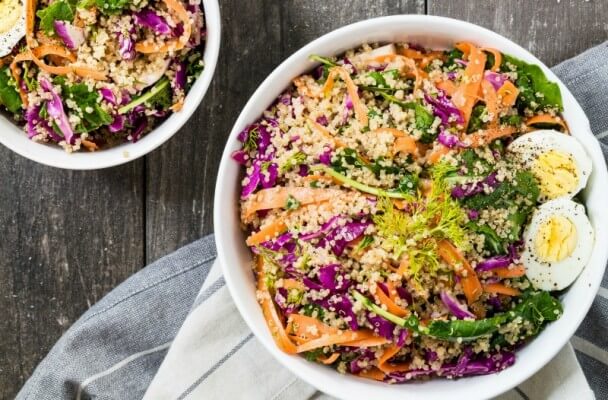
Kale Quinoa Salad Recipe
This delectable dish contains a boiled egg to supply up to 147 mg of choline. The rest of the salad also offers an abundance of various nutrients with healthful superfoods like kale and quinoa supplying 76% of the Daily Value (DV) for vitamin C, 32% of the DV for iron, 22% of the DV for potassium, 14 grams of protein, 7 gram of fiber and more than the full DV for vitamin A in every serving!
Ingredients: Quinoa, fresh baby kale, purple cabbage, carrots, fresh dill, boiled eggs, rice wine, extra virgin olive oil, black pepper.
Total Time: 25 minutes
| Yield: 8 servings
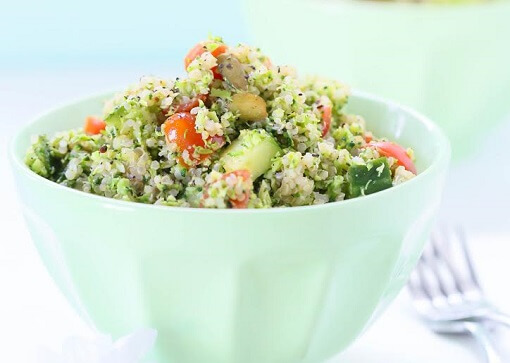
Broccoli Quinoa Salad Recipe {gluten-free}
Broccoli is a superfood that simply can’t be beat in the abundance of different nutrients it supplies, and choline is one such vitamin- with a hearty 63 mg in each cup of the veggies. The rest of the salad combines other healthful vegetables and seeds to supply impressive amounds of essential nutrients that include 22 grams of protein, 21 grams of fiber, 40% of the DV for iron, 73% of the DV for vitamin A, 29% of the DV for potassium, and more than 100% of the DV for vitamin C in every serving!
Ingredients: Fresh broccoli, quinoa, cucumber, cherry tomatoes, raw pumpkin seeds, sea salt, black pepper, Dijon mustard (optional), vinegar, extra virgin olive oil, maple syrup.
Total Time: 1 hour
| Yield: 8 servings
Snacks and Ingredient Sources of Choline
Especially for vegetarians, getting enough choline in your diet can be an uphill battle. Ensure your snacks aid your endeavor to eat healthy with these scrumptious collations that contain choline in addition to an abundance of other healthful nutrients.
Healthy Eating
- Healthy Snacks
- Healthy Highlights
- 5 Uses for Cacao Powder
- 5 Ways to Eat Farro
- 6 Best Gluten-Free Foods
- Alcohol and the Body
- Almond Flour Recipes
- Anti-Aging Superfoods
- Beat the Afternoon Slump
- Benefits of a Plant-Based Diet
- Benefits of Baobab
- Benefits of Cashews
- Benefits of Coconut Oil for Hair
- Benefits of Coconuts
- Benefits of Dates
- Benefits of Fenugreek
- Benefits of Garcinia Cambogia
- Benefits of Goji Berries
- Benefits of Kale Chips
- Benefits of Monk Fruit Sweetener
- Benefits of Peanuts
- Benefits of Pecans
- Benefits of Pistachios
- Benefits of Pumpkin Seeds
- Benefits of Spelt Flour
- Benefits of Steel Cut Oats
- Benefits of Sunflower Seeds
- Benefits of Tiger Nuts
- Benefits of Turmeric
- Benefits of Walnuts
- Benefits of Wheatgrass
- Best Food Fads
- Cacao vs Cocoa
- Caffeine-Free Energy Foods
- Chocolate That's Good for You
- Diet vs. Exercise
- Fat Burning Foods
- Food Myths Debunked
- Foods for Bone Density
- Foods for Colon Health
- Foods for Healthy Hair
- Foods for Healthy Skin
- Foods to Help Sleep
- Foods to Reduce Stress
- Green Tea Benefits
- Healthy Baking Flours
- Heart Healthy Habits
- High Protein Health Risks
- How to Boost Your Metabolism
- How to Lose Weight While Aging
- How to Throw a Vegan BBQ
- Kaniwa vs Quinoa
- Little Health Foods
- Low-Carb: Fad or Friend?
- Making Healthier Desserts
- Mediterranean Diet Meal Plan
- Natural Beauty Products
- Nuts for Weight Loss
- Preparing Vegan Meals
- Preventing Muscle Degeneration
- Rare Superfoods
- Reduce Sugar Intake
- Save Time By Going Vegan
- Smarter Snack Swaps
- Smoothie Ingredients
- Soy Protein vs Whey Protein
- Starting a Plant-Based Diet
- Steel Cut vs Rolled Oats
- Sugar Substitutes
- Vegan Proteins
- Vegan Substitutions for Fall Recipes
- Why Go Vegan
- Healthy Meals
- Healthy Recipes
- Sports Nutrition
- Nutrition and Special Diets
- 21 Day Fix
- 5 Popular Diet Similarities
- Alkaline Diet
- Anti-Inflammatory Diet
- Calorie Counting
- Carb Cycling Diet
- Celiac Disease
- Cholesterol
- Clean Eating
- Crohn's Disease
- DASH Diet
- Detox Diet
- Diabetes
- Diabetes Diet
- Diet Pill Dangers
- Fat Burning Foods
- Gluten-free Diet
- Glycemic Index
- Heart Health
- High Blood Pressure Diet
- High Fiber Foods
- How to Eat Healthy
- How to Lower Blood Pressure
- Hypertension
- IBS Diet
- Ketogenic Diet
- Liquid Diet
- Low GI Foods
- Low-Carb Diet and Foods
- Low-Fat High-Carb Diet
- Mediterranean Diet
- Mediterranean Diet Foods
- Military Diet
- Nutrition Labels Explained
- Paleo Diet
- Raw Food Diet
- Superfoods
- Sustainable Weight Loss
- Thrive Diet
- Vegan Diet
- Vegetarian Diet
- Weight Loss Shakes
- Whole30

